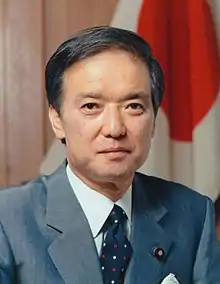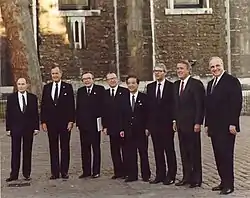Toshiki Kaifu
Toshiki Kaifu (海部 俊樹, Kaifu Toshiki, 2 January 1931 – 9 January 2022) was a Japanese politician who served as the 77th prime minister of Japan from 1989 to 1991.[1]
Toshiki Kaifu | |
|---|---|
海部 俊樹 | |
 Official portrait, 1989 | |
| Prime Minister of Japan | |
| In office 10 August 1989 – 5 November 1991 | |
| Monarch | Akihito |
| Preceded by | Sōsuke Uno |
| Succeeded by | Kiichi Miyazawa |
| Member of the House of Representatives for Aichi 9th District | |
| In office 20 November 1960 – 21 July 2009 | |
| Succeeded by | Mitsunori Okamoto |
| Minister of Finance | |
| In office 14 October 1991 – 5 November 1991 | |
| Preceded by | Ryutaro Hashimoto |
| Succeeded by | Tsutomu Hata |
| Minister of Education | |
| In office 28 December 1985 – 22 July 1986 | |
| Prime Minister | Yasuhiro Nakasone |
| Preceded by | Hikaru Matsunaga |
| Succeeded by | Masayuki Fujio |
| In office 24 December 1976 – 28 November 1977 | |
| Prime Minister | Takeo Fukuda |
| Preceded by | Michio Nagai |
| Succeeded by | Shigetami Sunada |
| Preceded by | Seiroku Kajiyama |
| Succeeded by | Hyosuke Kujiraoka |
| Personal details | |
| Born | 2 January 1931 Nagoya, Empire of Japan |
| Died | 9 January 2022 (aged 91) Tokyo, Japan |
| Political party | Liberal Democratic Party (1960–1994, 2003–2022) |
| Other political affiliations | New Frontier Party (1994–1997) "Assembly of Independents" (1997–1998) Liberal Party (1998–2000) New Conservative Party (2000–2003) |
| Spouse | Sachiyo Kaifu |
| Alma mater | Chuo University Waseda University |
| Signature |  |
Early life and education
Kaifu was born on 2 January 1931, in Nagoya City, the eldest of six brothers. His family's business Nakamura Photo Studio was established by his grandfather in the Meiji era, and was situated next to the Matsuzakaya flagship department store.[2]
Kaifu took the exam to the Aichi Prefectural Asahigaoka Senior High School, and while of the eleven students who took the test from the same school, nine were accepted and two, including Kaifu, were not. As part of the student labor mobilization during the war, he was placed in a Mitsui Heavy Industry factory where he assembled airplane engine parts day and night. In 1945, he was accepted in the Youth Airman Academy of the Imperial Japanese Army, but the war ended before his planned enrolment in October.[2] He was then educated at Chuo University and Waseda University.[3]
On 17 November 1957 Kaifu married Sachiyo Yanagihara, a female assistant to Member of the House of Representatives.[2][4]
Career

A member of the Liberal Democratic Party (LDP), Kaifu ran successfully for the 1960 Japanese general election and took office as the youngest member of the National Diet.[5] He served for sixteen terms, totaling 48 years.[6]
Kaifu was education minister before rising to lead the party after the resignations of Takeshita Noboru and Sōsuke Uno.[7] Facing Yoshiro Hayashi and Shintaro Ishihara,[8] Kaifu was elected on the platform of clean leadership.[9][10] He became the 76th Prime Minister of Japan in August 1989.[11]
On 10 August 1991, Kaifu became the first leader of a major country to make an official visit to China and break China's diplomatic isolation after the 1989 Tiananmen Square protests and massacre.[12] Kaifu ended Japan's participation in economic sanctions against China and offered $949.9 million in loans and an additional $1.5 million in emergency aid following flood damage in southern China in June and July.[13] In 1991 he sent the Maritime Self-Defense Force to the Persian Gulf in the wake of the Gulf War.[14]
Throughout his two Cabinets, Kaifu's faction was too small to push through the reforms he sought, and the continuing repercussions of the Sagawa Express scandal caused problems. He resigned in November 1991 and was replaced by Kiichi Miyazawa.[15]
In 1994, he left the LDP to become head of the newly-founded New Frontier Party.[16][17] He supported Ichirō Ozawa's party until he returned to LDP in 2003.[18] He was defeated in the election of 2009 by DPJ candidate Mitsunori Okamoto,[19] which witnessed the end of almost uninterrupted LDP dominance since 1955.[20] At the time of his defeat, he was the longest-serving member of the lower house of the Diet, and he was also the first former prime minister to be defeated at a re-election since 1963.[21]
Death
Kaifu was the last surviving former Japanese prime minister who had served in the 1980s. He died from pneumonia on 9 January 2022 at a Tokyo hospital, at the age of 91.[22] The announcement of his death to the media was delayed until 14 January.[23][24]
References
- "Toshiki Kaifu". Inter Press Service. Archived from the original on 30 June 2018. Retrieved 7 January 2013.
- Kaifu, Toshiki; 海部俊樹 (2015). Kaifu Ttoshiki kaisōroku : ware o motte inishie to nasu. Hiroki Kakimi, 垣見洋樹. pp. 30–35, 223–224. ISBN 978-4-931388-95-6. OCLC 931496864.
- Akimoto, Daisuke (14 January 2022). "In Memory of 'Kaifu Diplomacy' During the Gulf War Turmoil". The Diplomat. Retrieved 16 January 2022.
- Kaifu, Toshiki; 海部俊樹 (2010). Seiji to kane : Kaifu Toshiki kaikoroku. Shinchōsha. pp. 38–39. ISBN 978-4-10-610394-0. OCLC 682540758.
- Wiseman, Steven R. (9 August 1989). "Japan's Troubled Successor". The New York Times. Retrieved 17 April 2019.
- "愛知県名誉県民の候補者について" (in Japanese). Aichi Prefectural Government. 2 September 2011. Archived from the original on 4 March 2023. Retrieved 4 March 2023.
- Yates, Ronald E. (9 August 1989). "New Prime Minister elected in Japan". Chicago Tribune. Retrieved 17 April 2019.
- Jameson, Sam (5 August 1989). "2 More Join Race for Japanese Premier : Ex-Ministers of Transportation, Health Also Seek to Succeed Uno". Los Angeles Times. Retrieved 17 April 2019.
- "Japanese official quits over affair". The New York Times. Associated Press. 25 August 1989. Retrieved 17 April 2019.
- Hiatt, Fred (3 March 1990). "Japan's Kaifu faces new hints of scandal". The Washington Post.
- Pringsheim, Klaus H. (1991). "The Political Ordeal of Toshiki Kaifu (1990–1991)". American Foreign Policy Newsletter. 14 (3): 3–17. doi:10.1080/07383169.1991.10392623.
- "Japanese Prime Minister Meets With China's Communist Leader". Associated Press. 12 August 1991. Archived from the original on 17 April 2019. Retrieved 17 April 2019.
- "Prime Minister Toshiki Kaifu departs Saturday for Beijing to..." UPI. Retrieved 22 October 2018.
- "Ex-Japan PM Kaifu, who dispatched SDF to Persian Gulf, dies at 91".
- Jameson, Sam (2 February 1992). "Miyazawa's Party Faction Chief Indicted". Los Angeles Times. Tokyo. Retrieved 11 January 2013.
- "New party taps". Sun Sentinel. 9 December 1994. Retrieved 17 April 2019.
- "Ex-premier to head new Japanese party". The Washington Post. 8 December 1994. Retrieved 17 April 2019.
- Dobson, Hugo; Rose, Caroline (2019). "The Afterlives of Post-War Japanese Prime Ministers". Journal of Contemporary Asia. 49 (1): 127–150. doi:10.1080/00472336.2018.1460389.
- Murakami, Mutsuko (1 September 2009). "Untested New Regime Raises Fresh Hopes". Inter Press Service. Retrieved 17 April 2019.
- Maeda, Ko (September–October 2010). "Factors behind the Historic Defeat of Japan's Liberal Democratic Party in 2009". Asian Survey. 50 (5): 888–907. doi:10.1525/as.2010.50.5.888.
- "Several LDP bigwigs sent down to defeat". The Japan Times. Kyodo News. 31 August 2009. Retrieved 17 April 2019.
- FORMER PM KAIFU DIES AT 91
- "海部俊樹元首相が死去 91歳". NHK. 14 January 2022. Retrieved 14 January 2022.
- "Former Prime Minister Toshiki Kaifu dies at 91". 14 January 2022.
External links
- KAIFU, Toshiki International Who's Who. Retrieved 3 September 2006.
- Appearances on C-SPAN